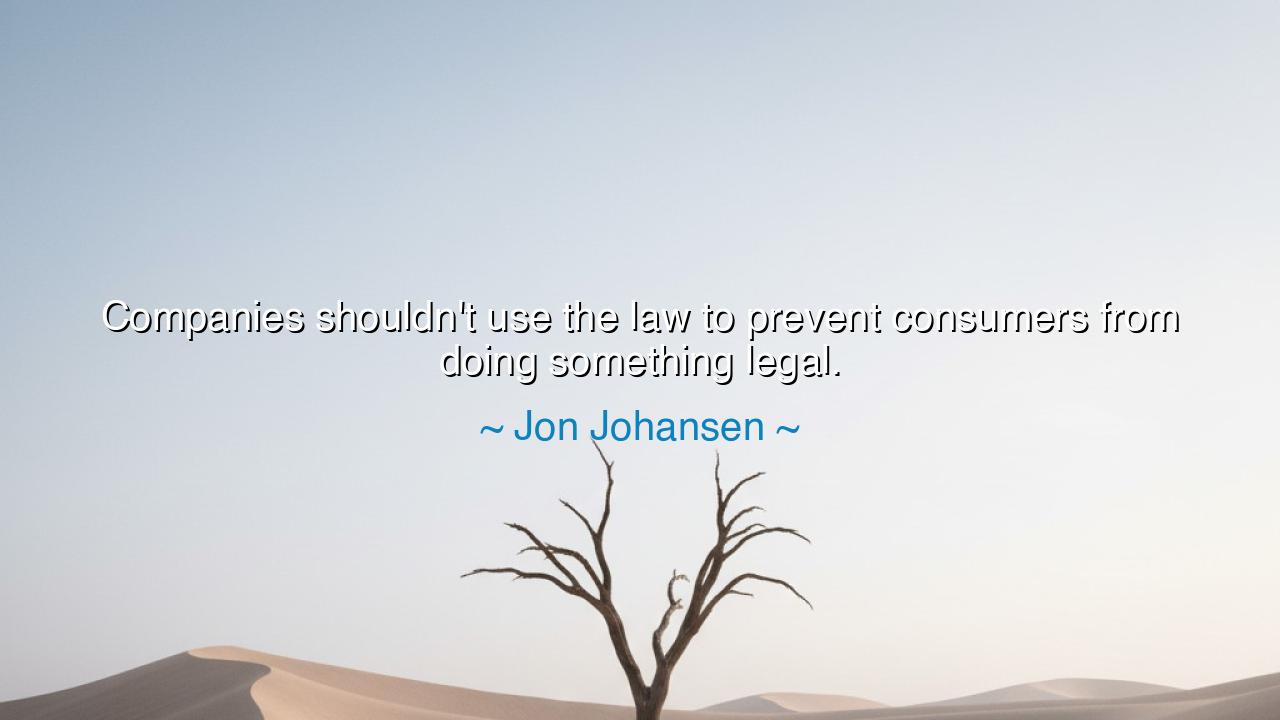
Companies shouldn't use the law to prevent consumers from doing






There are times in history when the balance between freedom and control trembles upon the edge of a blade — when those who create tools seek to bind those who use them. It was in such a moment that Jon Johansen, the young Norwegian known to the world as “DVD Jon,” declared: “Companies shouldn’t use the law to prevent consumers from doing something legal.” His words burn with the fire of principle — the eternal struggle between innovation and restriction, between the free will of the individual and the guarded power of institutions. In this statement lies a cry for fairness: that the law, which was created to protect the people, must never become the weapon of the powerful against those same people.
The origin of this quote emerges from the dawn of the digital age, when the walls of control were being built not of stone, but of code. In the late 1990s, Jon Johansen, then just a teenager, developed a program called DeCSS, which allowed users to unlock and copy DVDs they already owned. His intention was not theft, but freedom — the right to watch and use one’s legally purchased films on any device. Yet for this act, he was dragged into court by powerful corporations who claimed he had broken the digital locks they had placed on their media. It was in the face of this accusation that Johansen spoke these words — a defense not only of himself, but of every consumer who has ever been told that ownership is an illusion.
His statement cuts to the heart of an ancient truth: that law must serve justice, not power. From the time of the Roman Empire, rulers have sought to stretch the law to their own ends, disguising greed as governance. The Lex Julia, meant to protect virtue, was twisted to punish rivals. The Enclosure Acts of England, written to “manage” land, stripped the poor of their commons and gave them to the wealthy. So too, in Johansen’s world, corporations clothed themselves in legality to deny freedom to those they claimed to serve. He was not fighting a war of piracy, but a war of principle — insisting that legality must not be confused with morality, and that no law should forbid what is right simply because it threatens the powerful.
To understand the full weight of his words, one must see how technology has always tested the limits of freedom. When Gutenberg invented the printing press, the Church and monarchs sought to control its use, fearing that unfiltered knowledge would destroy their authority. Books were banned, printers jailed, and presses destroyed — yet the written word spread like wildfire, reshaping the destiny of mankind. Johansen’s stand belongs to that same lineage of rebellion. He, too, was a craftsman of knowledge, defying those who believed that creativity should be chained. His message echoes across the centuries: that progress is not born in obedience, but in the courage to question unjust boundaries.
Johansen’s words also remind us of the fragility of freedom in the modern world. The law, which should defend the people, can be easily bent by those with wealth enough to write its language. When companies seek to dictate not only what we may own, but how we may use it, they transform consumers into subjects. His warning is clear: the digital realm, though invisible, can become a prison if we surrender our rights to those who claim to “protect” us. The ancient philosophers would have recognized this danger. Plato warned that tyranny often begins not with the sword, but with laws made “for our safety.” Johansen saw that same tyranny in code — laws written not in scrolls, but in software.
Yet his message is not one of defiance alone — it is also one of responsibility. To resist unjust laws is not to live in chaos, but to restore balance. The wise understand that freedom without conscience is destruction, just as control without justice is tyranny. Johansen’s stance teaches us to respect the purpose of law while challenging its abuse. The law must protect creation, not suffocate it; it must defend ownership, not redefine it to suit profit. Each citizen must be vigilant — not as an enemy of law, but as its guardian, ensuring that it serves the many, not the few.
So let this quote endure as a teaching to future generations: never allow power to hide behind legality. Remember that what is “legal” is not always what is “right.” Laws are tools, not chains — and they must be wielded by the hand of justice, not by the hand of greed. When companies, kings, or governments use law to deny freedom, it is the duty of free men and women to speak as Johansen did — firmly, clearly, and with courage. For civilization is not built by those who obey without thought, but by those who dare to remind the world that the law exists to protect liberty, not to imprison it.






AAdministratorAdministrator
Welcome, honored guests. Please leave a comment, we will respond soon